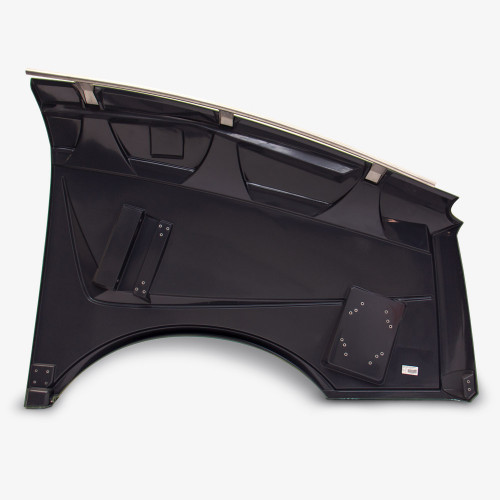
VEX process manufactured side panel for agricultural vehicle industry
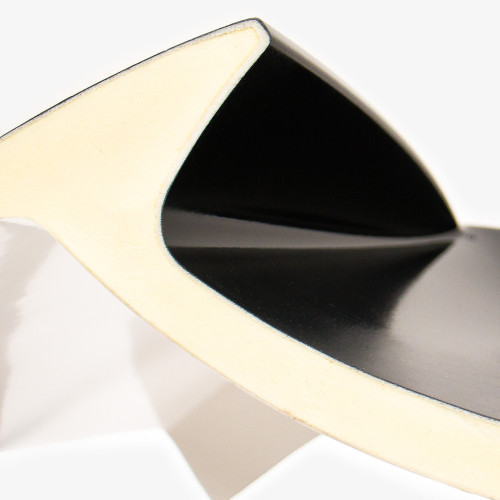
Cross section through a VEX sandwich construction
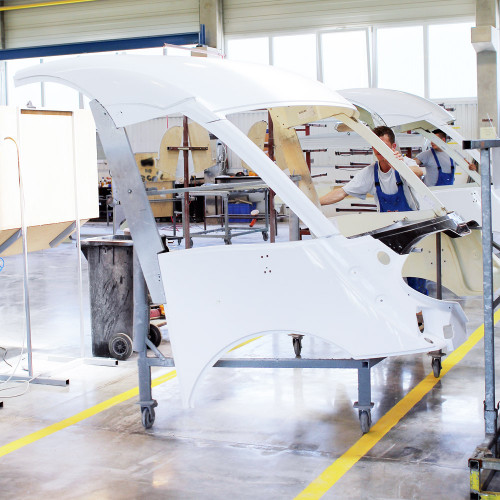
Camper front mask on the way to further processing
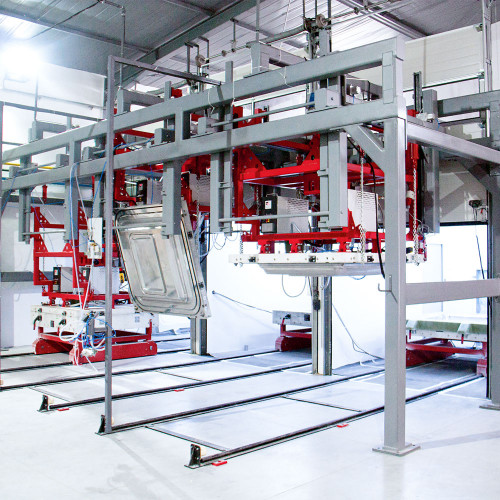
Tool holding device with three tools
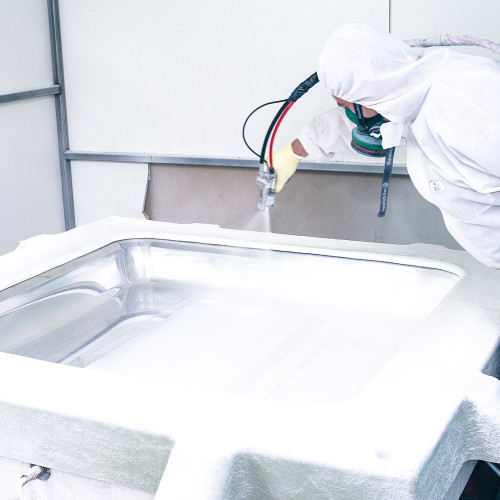
Applying the gelcoat top layer
In this manufacturing method, special fiberglass mats and synthetic resins are combined in a closed mold. Inside the mold’s vacuum, foam resin is distributed exceptionally evenly as evenly as possible – resulting in an unusually high surface quality. Products manufactured using this process are characterized by their light weight and high resilience.
Fiber-reinforced composites owe their widespread use in many industries primarily to their high strength combined with low weight. They are occasionally referred to as the «steel of the 21st century». Corrosion, chemical and weathering resistance, good insulating properties and the best shaping possibilities are added to this. This combination of properties has helped this group of materials to achieve its current importance, for example in the automotive sector. It is impossible to imagine truck and bus construction and recreational vehicles without fiber-reinforced synthetic resins. Their share in passenger car production is also increasing.
The increasing pressure to save energy has led to considerations on how to further reduce the weight of fiber-reinforced plastics. One good way of doing this is to use foamable polyester resins, which can reduce the specific weight of composite parts by up to 30 percent to below 1 g/ccm – while still maintaining high strength values. Sandwich inserts made of rigid foam further reduce part weight and improve stiffness, thermal and acoustic insulation.
Foamable polyester resins are processed using the vacuum expansion process – our in-house designation is VEX. It is a closed process in two-part molds made of plastic or metal. The part surfaces and contours are tool-defined.
As a rule, a surface gelcoat is first applied to one side of the mold and then the fiber reinforcement with or without a rigid foam core is inserted. If required, local metal or wood anchors, cables and other conduits and empty tubes are added to sandwich parts. After closing and locking the mold – a separate clamping machine is not normally required - the foamable resin is pumped in, from which microcellular structural rigid foam is produced with vacuum assistance. It encases the fiber reinforcement together with the inserts. The result is smooth parts with a high surface quality on both sides which, if necessary, are finished by machining on CNC equipment. If gelcoat has been used, no further painting is necessary.
A particular advantage of the process is the possibility of producing very large-area parts. The largest size we have produced to date is 3.6 x 2.3 meters. This does not have to involve only flat parts. Heavily deformed vehicle fronts for motor homes show that there are virtually no limits to design wishes.
Sandwich parts receive either rigid foam cores made from sheet material or molded foam inserts, which we produce in-house and which may well have local wall thickness differences. Other filler materials are also used.
Mold costs are low in the case of plastic molds. Annual requirements of just a few hundred parts can therefore be produced economically. On the other hand, annual production runs of over 10,000 parts with multiple metal molds in intermittent production are quite possible and are already being realized.
The possibility of integrating all conceivable inserts in sandwich parts allows enormous savings to be made in assembly costs. For example, in the case of a motorhome rear wall, the wiring for the taillights and license plate lighting is already present on the outside, while the inside surface is prepared for the installation of wall cabinets, lighting fixtures, etc., or otherwise serves as a functional surface.
Recreational vehicle manufacturers were the first to recognize the advantages of the VEX process. In the meantime, however, other sectors have also become important customers: Manufacturers of agricultural machinery, bus and truck factories, producers of emergency vehicles, etc. The following application examples show the variety of customers and customer sectors.
Many customers make use of the possibility to order pre-assembled structures from C.F. Maier. For example, vehicle fronts already fitted with windshields, windshield wipers and lighting are built for several manufacturers of fully integrated motor homes. We also supply complete pop-up sleeping roofs for motorhomes. Metallic or other special paint finishes are always possible.
C.F. Maier is proud to have developed a high level of process engineering expertise in the special field of composite plastics with foamable polyester resins and to have convinced numerous renowned customers of their advantages.